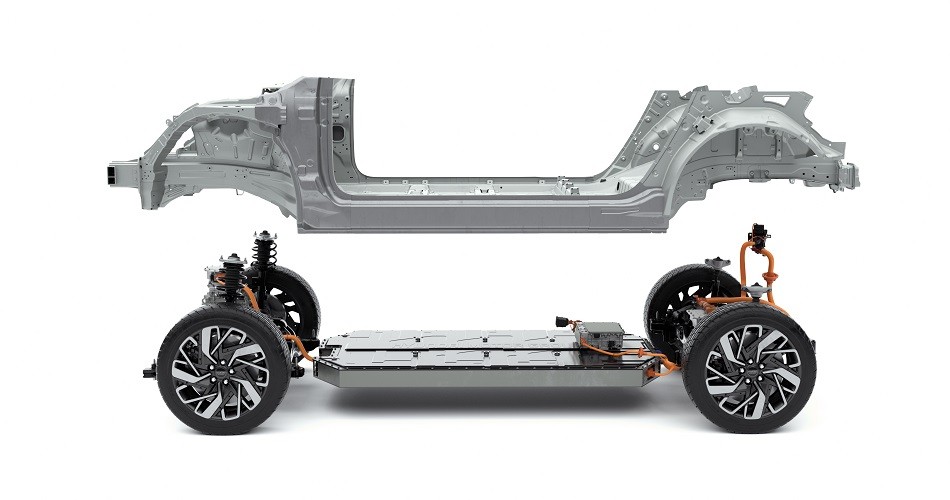Hyundai has unveiled its new Electric-Global Modular Platform (E-GMP).

Hyundai Motor Group has unveiled its new Electric-Global Modular Platform (E-GMP), a dedicated battery electric vehicle (BEV) platform. Revealed online today during an ‘E-GMP Digital Discovery’ event, the platform will serve as the core technology for Hyundai Motor Group’s next-generation BEV line-up. From 2021, the E-GMP will underpin a range of dedicated new BEVs, including Hyundai Motor Company’s IONIQ 5; Kia Motors Corporation’s first dedicated BEV to be revealed in 2021; and a series of other models.

The platform secures battery safety through a battery support structure made of ultra-high strength steel. Hot-stamped steel components surround this structure for additional rigidity. Collision energy can be absorbed efficiently thanks to energy-absorbent sections of the body and chassis, effective energy load paths, and a central section of the battery pack tightly bound to the vehicle body. Moreover, by strengthening the structure of the load support section, located in front of the dashboard, engineers have been able to minimize collision energy to the power electric system and battery. The A-pillar’s load distribution structure also prevents deformation of the passenger cell.

The battery pack itself – mounted between the front and rear wheel axles – will be the most power-dense system that Hyundai Motor Group has ever created. This is partly thanks to its enhanced cooling performance, a result of a new separate cooling block structure which helps make the battery pack more compact. With energy density enhanced by around 10% compared to existing EV battery technology, the battery packs are lighter, can be mounted lower in the body, and liberate more cabin space.

The E-GMP’s compact new power electric (PE) system consists of a powerful motor, EV transmission and inverter. These three components are integrated into a single compact module. This ensures powerful performance by raising the motor’s maximum speed by up to 70 percent compared to existing motors. The high-speed motor is smaller than other motors while providing comparable performance, and it gives efficiencies in both space and weight.

E-GMP offers 800V charging capability as standard and enables 400V charging, without the need for additional components or adapters. The multi-charging system is a world’s first patented technology which operates the motor and the inverter to boost 400V to 800V for stable charging compatibility. A BEV based on E-GMP is capable of a maximum range of over 500km with a fully charged battery, according to the Worldwide Harmonized Light-duty vehicle Procedure (WLTP). Moreover, it can high-speed charge up to 80 percent in just 18 minutes and can add up to 100km of driving range in just five minutes.

Unlike previous BEVs, which only accept one-way charging, the E-GMP’s charging system is more flexible. The E-GMP’s newly developed Integrated Charging Control Unit (ICCU) represents an upgrade from existing On-Board Chargers (OBC), which typically only allow electricity to flow in a single direction from an external power source. The ICCU enables a new vehicle-to-load (V2L) function, which can additionally discharge energy from the vehicle battery without additional components. This enables BEV based on the E-GMP to operate other electric machinery (110 / 220V) anywhere. The system can even be used to charge another EV. The new V2L function can supply up to 3.5kW of power and operate a mid-sized air conditioner unit and a 55-inch television for up to 24 hours.

The E-GMP will underpin Hyundai Motor Group’s plans to introduce a total of 23 BEV models including 11 dedicated BEV models, and sell more than 1 million BEVs worldwide by 2025. As part of its BEV vision, Hyundai Motor Company launched its dedicated ‘IONIQ’ BEV brand in August 2020, which includes three dedicated BEV models, the IONIQ 5,6 and 7 by 2024. This currently covers various vehicle segments. Kia is also undergoing a transformation for the era of electrification, based on its ‘Plan S’ mid-to-long term strategy. In September, Kia announced plans to increase the share of BEV sales volumes as a proportion of total sales to 20 percent by 2025. The company also recently published an early image of seven dedicated BEV models to be released sequentially by 2027.
